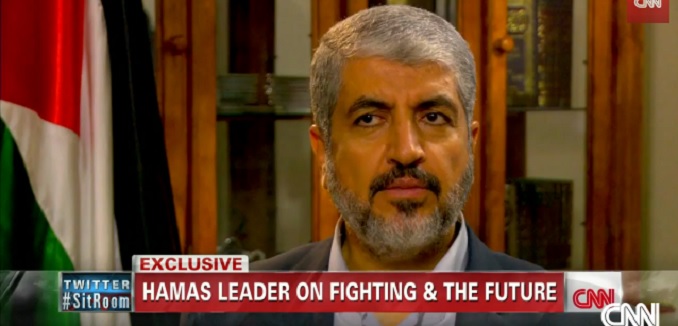Israel and Palestinian factions in the Gaza Strip late Monday officially accepted a three-day Egypt-sponsored truce, effective 8 a.m. local time Tuesday and designed as a first step in ending roughly a month’s worth of fighting in the Gaza Strip. The proposal is almost identical to one that Israel accepted weeks ago, but that Palestinians leaders had rejected out of hand for not meeting a range of demands broadly considered to be non-starters.
The Israeli army had subsequently deployed ground troops into the Gaza Strip, targeting Hamas’s tunnel and rocket infrastructure. The Jerusalem Post conveyed statements from Israeli officials who “pointed out that [the ceasefire] acceptance came after Israel finished destroying the terror tunnels” that run underneath the Gaza-Israel border, and which had been built to empty out within a few hundred yards of sparsely defended Israeli population centers.
Hamas’s activation of its offensive tunnel network – the terror group a few weeks ago dispatched over a dozen commandos to attack an Israeli community of roughly 150 people – had originally triggered the ground invasion. The belated Palestinian acceptance – which leaders reportedly struggled to justify – had been widely expected as the conflict dragged on with steady gains for the Israelis without any spectacular Hamas successes.
Yaakov Lappin, the Jerusalem Post‘s national security correspondent, had evaluated that “the IDF has destroyed Hamas’s flagship terrorism project: its network of tunnels that snuck into Israel. Hamas spent five years preparing this strategic threat; the IDF wrecked 31 tunnels in two weeks.”
Amos Yadlin – the former head of the IDF’s military intelligence shop (Aman) and currently the director of Tel Aviv University’s Institute for National Security Studies (INSS) – assessed that Hamas’s violation of a ceasefire earlier this month had been a watershed:
Hamas’ flagrant violation of the ceasefire on August 1, 2014 enabled Israel to change its strategic position and choose an alternative that, at least in the short term, places Hamas in a difficult strategic situation. Israel regained international legitimacy for its actions; Hamas was again cast as a terrorist organization lacking all credibility that for the sixth time violated a ceasefire that Egypt and the international community initiated and Israel accepted. Changing strategic course, Israel decided to deny Hamas veto power over ceasefires and took the initiative back into its own hands, clarifying that it was not negotiating with Hamas and not granting it any achievement, neither in terms of a ceasefire nor in terms of an agreement.
Yadlin, who had accurately predicted the escalatory trajectory of the conflict in its earliest days, emphasized that “Israel regained international legitimacy for its actions; Hamas was again cast as a terrorist organization lacking all credibility… Israel decided to deny Hamas veto power over ceasefires and took the initiative back into its own hands, clarifying that it was not negotiating with Hamas and not granting it any achievement, neither in terms of a ceasefire nor in terms of an agreement.”
Eyal Zisser – the head of Tel Aviv University’s Middle Eastern and African History department and a senior research fellow at the Moshe Dayan Center for Middle Eastern and African Studies – had his analysis published under the simple headline “Hamas lost big”:
No gimmickry will undo this Hamas-made catastrophe; neither will the tactical achievements it has boasted of. Hamas’ actions resulted in an unprecedented catastrophe for Gazans. Its overarching mission — to be the leader of many Palestinians, failed spectacularly.
There are indications that the Palestinian organization will have difficulty spinning the results as a victory. Hamas’s leadership had quietly but broadly assured supporters that a series of strategic ‘surprises’ – long-range missiles, drones, and attack tunnels – would see the group notch major victories against Israeli civilians and civilian infrastructure. Iron Dome anti-missile batteries dampened the impact of the rockets, Israeli anti-aircraft assets neutralized drone flights, and Israel ended up destroying the attack tunnels.
Fox News had already reported days ago that not “not only is Hamas losing its latest battle with Israel, it may also be losing its popular support,” the perception among Palestinians being that the organization had dragged the Gaza Strip into a bruising conflict for no gain.
[Photo: CNN / YouTube]




